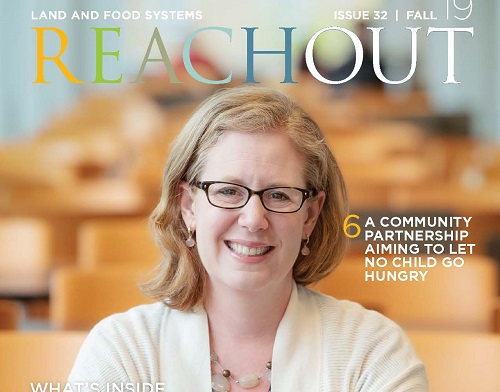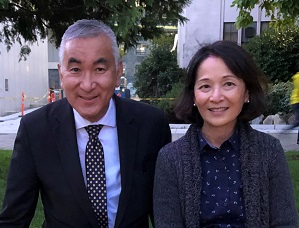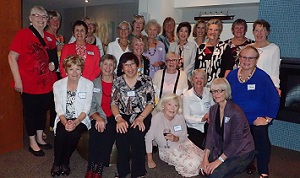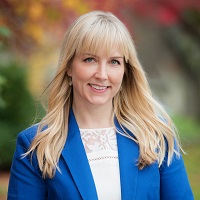Food Science Alumna Opens a Local Ice Cream Shop
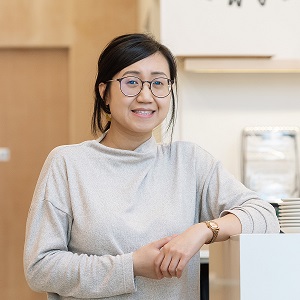
Betsy Ng
Food Science Alumna Opens a Local Ice Cream Shop
When it comes to making ice cream, Betsy Ng (BSc Food, Nutrition and Health 2010) doesn’t take shortcuts. “The flavour and the texture are so important, and the best way to ensure a dessert-lover’s satisfaction is to start with natural and, if possible, local ingredients.”
Ng is the co-owner of Elephant Garden Creamery, located on Commercial Drive in Vancouver. She opened the shop with her brother, Bruce, in September 2018.
“Bruce and I bring very different strengths to the business, so we’re able to divide up the work without getting into each other’s way,” Ng laughs. The name of the shop is another example of their partnership. “I love elephants, and my brother suggested ‘garden’ to evoke a calm and relaxing place to enjoy ice cream. We also added creamery to showcase the fact that we offer other dairy-based desserts, and we hope to grow the menu in the future.”
After graduating from UBC, Ng worked at a couple of different food companies doing quality assurance, but the dream of
opening a dessert shop was never far from her mind. Yet like most young entrepreneurs, she realized she needed a specialty
in order to shine in a crowded field. “Especially in a city like Vancouver, where opening any business comes with a financial risk,” Ng said. “I really wanted to take the time and get it right.”
In her spare time, she began doing research into ice cream manufacturing, and eventually decided to enroll in two
courses to take her passion further. The first was an ice cream manufacturing course in the U.S., followed by second a gelato-making workshop in Italy.
“I spent four weeks in Bologna, learning how to make fresh gelato. The most important skill I took away from this trip was
the understanding of the functionality of the ingredients, and learning how they work together. I wouldn’t be able to make
the flavours that I do today without that knowledge.”
Her flavours are now a major draw for customers. “Our bestsellers are the Mango-Coconut Sticky Rice, Hong Kong Milk Tea, and Vietnamese Coffee,” Ng noted. “But we try to keep things interesting by offering three rotating seasonal flavours.” She also found that creating original flavours has become much easier with time, as she is now able to produce a result within one or two tries.
As for her inspiration, Ng doesn’t have to look much further than through the windows of her shop. “Vancouver is such a diverse and multi-cultural city, and I wanted to reflect that in our flavours.”
Ng first began making the ice cream in a commercial kitchen space, and selling it from a cart at farmers’ markets across
the city in the summer. It was a great way to be a part of the community and begin to grow a customer-base.
To entice customers to visit during the wet Vancouver winters, Ng got creative and introduced a new menu item: salted
cheese boba tea toast, served with your choice of ice cream flavour. “It was a huge hit, and people continue to ask for it!”
Follow @elephantgardencreamery on Instagram, and visit their store at 2080 Commercial Drive, Vancouver.
Tagged with: 2019, Alumni, Food Science
New Faculty Profile: Alexandra Protopopova
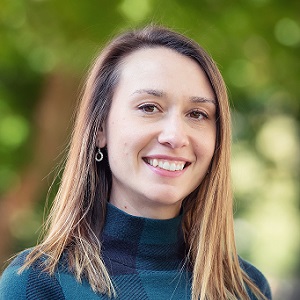
Alexandra Protopopova
New faculty profile: Alexandra Protopopova
Assistant Professor Alexandra (Sasha) Protopopova wants to know why some animals are adopted into new homes while others are left behind.
As the inaugural BC SPCA Chair in Companion Animal Welfare, she wants to understand how adopters make choices in animal shelters and what can be done to increase adoptions. With a PhD and MSc in Behaviour Analysis (Psychology) at the University of Florida and two Bachelor of Science degrees from the University of Massachusetts Amherst (one in Pre- Veterinary and Animal Sciences and the other in Neuroscience), Protopopova aims to improve the welfare of companion animals in shelters, pet homes and service work.
As a new faculty member at UBC, she is excited to collaborate with our leading animal welfare experts and to mentor the most enthusiastic students she has met thus far.
One of her current projects, led by PhD student Allison Andrukonis, is to validate a new, non-invasive measure of cat stress in animal shelters, and find out if this measure can predict success in foster homes. Another project, led by PhD student Megan Arant, investigates the effect of various handling techniques of therapy dogs on dog welfare outcomes, as well as the children’s received benefits from these dogs.
Her most fulfilling research projects combine community engagement with applied research.
“Last year, my lab organized 10 community pet adoption events, in which we collected marketing data on consumer perception
of various variables within the event,” said Protopopova. “The aim of the study was to establish best-practices for conducting off-site dog adoption events with the goal of understanding how adopters make choices to increase adoption rates and decrease unnecessary dog euthanasia.” Not only did they collect lifesaving data, but 40 dogs were also successfully adopted.
She is collaborating with Wesley Dotson, an autism expert and behaviour analyst from the Texas Tech University Burkhart
Centre for Autism Education and Research. They are in the middle of a National Institutes of Health-funded clinical trial
on the effect of therapy dogs in social skills group classes for children with autism spectrum disorders.
With her educational background in behaviour analysis, Protopopova relies greatly on single-subject experimental designs control for experimental variability, which is ideally suited to investigate any interventions that affect behavioural
change in humans and animals.
In such designs, each participant experiences both the experimental and control (baseline) conditions repeatedly until
data differentiation is seen. “We can be convinced of the effect or lack thereof of the intervention on that specific individual,” she said. “We repeat these studies across individuals to obtain generalization. In the end, one can say, ‘for seven out of 10 people, this intervention was effective,’ rather than saying, ‘this intervention was, on average, effective,’ which is less precise.”
Some of the planned projects she will do in collaboration with the BC SPCA span various topics such as pet dog import, behaviour and welfare of rabbits and pet rats, rehabilitation of cats from hoarding cases, and the human aspect of the animal-human bond.
“A close collaboration with the BC SPCA is a dream come true,” said Protopopova. “I get to focus on applied research while
making a real difference in the community.”
Tagged with: Applied Animal Biology, Applied Biology, Faculty
News, Notes & Milestones
News & Notes
Welcome Back to UBC
Many thanks to those who came out to UBC Homecoming on September 14. LFS was happy to see our alumni, family and friends return to Vancouver campus. Thousands joined us to enjoy live music, food trucks, hands-on activities and our popular LFS mascot, Reggie the Bee, who gave out many high fives!
Vancouver Summer Program draws international students
This past summer, Land and Food Systems opened up the doors of the world to our academic programs.
LFS participated in UBC’s Vancouver Summer Program, which offers courses to international undergraduate students from cooperating universities. These students get the opportunity to experience two UBC academic courses, with some earning course credit from their home institution, while learning about Canadian culture and practices.
For several years, LFS has offered courses but this past year showed tremendous growth, with the number of participants in the LFS courses increasing from 66 to 142 between 2018 and 2019.
The Faculty’s June program packages included Nutrition and Healthy Eating, and Agribusiness Management, while the July packages were Nutrition and Healthy Eating, and Food Science and Sensory Evaluation. The courses are interactive and involve hands-on cooking, evaluation and group work.
Some of the field trips included visiting Granville Island, UBC Farm and Roots on the Roof, the student-run rooftop community garden on UBC’s Student Union Building.
Professor Emerita Eunice Li-Chan Receives an Alumni Builder Award
Congratulations to Professor Emerita Eunice Li-Chan on receiving an Alumni Builder Award from UBC in September.
This award recognizes UBC alumni who have significantly contributed to the University and enriched the lives of others, and in doing so, have supported alumni UBC’s mission of realizing the promise of a global community with shared ambition for a better world and an exceptional UBC.
Li-Chan received the award for her dedication to education and commitment to excellence in agricultural sciences and food chemistry in the Faculty of Land and Food Systems. She graduated with a Bachelor of Science in Agriculture in 1975, and a PhD in Food Science in 1981. She also earned a MSc in Biochemistry from the University of Alberta.
After working for the Faculty as a Research Associate, she became Assistant Professor in 1992. She retired in 2017 after more than 30 years of hard work and dedication.
Home Economics Class of 1969 Celebrate 50th Year Reunion
The Home Economics Class of 1969 celebrated their 50th reunion this September at Sunset Beach in Vancouver. Carol Omstead (Bachelor of Home Economics 1969) felt she couldn’t let the occasion pass by, and decided to step forward to organize the night.
“There were 25 of us who were able to attend, and we had a great time reminiscing of our classes, and of late nights cramming for an exam,” Omstead recalls. “It was incredible to see how far everyone has come. While many of us set out to become teachers or dietitians, others sought graduate school or worked in everything from farming to government.”
Is your graduating class planning on hosting a reunion? We’d love to be a part of it! Contact Niki Glenning, your Alumni Relations Manager, at niki.glenning@ubc.ca or 604 822-8910.
Milestones
Food, Nutrition and Health Researcher Wins Two Awards
Assistant Professor Crystal Karakochuk recently won two awards to study the role of nutrition on disease. The first is a three-year CIHR Project Grant for research conducted at BC Children’s Hospital on folic acid supplementation in children with sickle cell disease. The second is a Michael Smith Foundation for Health Research (MSFHR) 2019 Scholar Award for her project Advancing nutritional hematology to reduce the burden of anemia and inform nutrition policy. The (MSFHR) Scholar Program award has a 5-year term and supports early-career health researchers who are building leading-edge programs in B.C.
Funding Supports Fast-Breaking Research
Two LFS researchers won New Frontiers in Research Fund Explorations awards, which focuses on fastbreaking, high-risk research that is international and interdisciplinary. Assistant Professor and food scientist Derek Dee investigates the behaviour of proteins under different conditions, and will study how soy, pea, lentil and peanut proteins can be further improved in taste and texture as satisfactory meat replacements. In a separate award, Assistant Professor Frederik Noack is leading a new international project measuring the environmental impact of urbanization in developing countries, studying how biodiversity and greenhouse gas emissions are impacted, while considering economic factors and population trends.
Mahsa Jessri Earns One of Six Banting Research Awards
Mahsa Jessri, Assistant Professor, was one of six national recipients of a 2019 Banting Research Foundation Discovery Award. She aims to predict how dietary patterns contribute to longevity, cardiovascular disease and diabetes by studying the impact of diet and food policy on public and population health.
Food Scientists Win NSERC Discovery Grants
Three LFS food scientists were awarded five-year NSERC Discovery Grants: Assistant Professor Derek Dee will study how to assemble and design protein nanofibrils using genetic and chemical modification for potential applications in food, biomaterials and medicine; Associate Professor Xiaonan Lu will study how food processing and preservation conditions could induce the formation and resuscitation of campylobacter dormancy; and Professor David Kitts’ research involves quantifying how Maillard Reaction products generated in heat processing of foods mitigate oxidative stress and inflammatory reactions that occur in the intestine.
UBC Public Scholars Initiative Funds Animal Welfare Student
PhD candidate Michael Brunt was the recipient of a UBC Public Scholars Initiative (PSI) to engage in public dialogue, produce creative forms of scholarship,and explore diverse career pathways. Brunt is studying animal welfare under supervisor Professor Daniel Weary. The PSI allows him to expand engagement with the public to gain a greater understanding about how perceived transparency can influence trust and the social acceptability of using animals in scientific research.
Canadian Nutrition Society Conference Gives Nod to LFS Students
Human Nutrition graduate students were recognized at the annual Canadian Nutrition Society (CNS) Conference in Niagara Falls, Ontario. Brock Williams (PhD candidate, supervisor Crystal Karakochuk) won first place in the Infographic presentation, and Mirah Valdes (MSc candidate, supervisor Jennifer Black) took second place in the CNS Poster Competition.
Monitoring Ecological Sustainability at the UBC Farm
Monitoring Ecological Sustainability at the UBC Farm
The UBC Farm acts as a living lab for researchers working to improve sustainability in agricultural systems, and is now a key node in an international experimental network of diversified research farms.
The Diversified Agroecosystems Research Cluster, based at the Centre for Sustainable Food Systems (CSFS), is positioning the UBC Farm as a Long-Term Socio-Ecological Research Station (LTSER). The Farm will become one of North America’s few diversified farms to become a LTSER.
“This is a game-changing development that will transform research possibilities at UBC and beyond,” said Laura Morillas, Research Manager at CSFS.
Two new long-term ecological monitoring programs are now underway at the UBC Farm, supported by the cluster. Using lowcost
data collection methods, these projects offer new data-driven management tools to help farmers understand ecological
outcomes related to their management practices, providing key insights on ways to both mitigate and adapt to climate change.
Data-driven agroecology allows farmers to observe, measure and respond in real time to crop and climate variabilities. While
data-driven technology has been adopted on some larger commercial farms focusing on commodity crops, it is relatively new for
smaller and diversified farms.
These new projects aim to change that.
UBC Farm as a Living Lab: Water Sustainability
Agriculture accounts for 70 per cent of global water allocations, placing water quality and scarcity at the centre of issues related to sustainable food production and food security.
Mark Johnson, a CSFS associate member, is piloting an agricultural water use data system at UBC Farm. Johnson is Canada Research Chair in Ecohydrology and a UBC Professor with a joint appointment in the Institute for Resources, Environment and Sustainability and the Department of Earth, Ocean, and Atmospheric Sciences in the Faculty of Science.
Sensors powered through small solar panels combined with data connectivity, visualization and analytics will help the UBC Farm develop improved irrigation and post-harvest water use strategies.
“Measuring the amount of water used in irrigation, together with data on water at different depths in the soil, will help farmers evaluate the effectiveness of their irrigation strategies,” said Johnson. “We are also tracking the amount of water used to wash produce after harvest to better understand where opportunities lie for improving overall water use in agriculture.”
His team has installed an autonomous soil moisture monitoring network and climate station to check plant water needs, soil water status and climatic conditions.
By evaluating opportunities to reduce water use at UBC, UBC Farm and CSFS are able to transfer this knowledge and affordable technology to planners, regulators and farmers that are trying to meet growing food security issues.
UBC Farm as a Living Lab: Biodiversity Monitoring
UBC faculty and students in the Diversified Agroecosystems Research Cluster have developed and are implementing a world-class long-term biodiversity monitoring program for agricultural landscapes at the UBC Farm.
The project is coordinated by the CSFS, with research support from the cluster, as well as the Campus Biodiversity Initiative: Research and Demonstration (CBIRD), and UBC Campus as a Living Laboratory Initiative.
Juli Carrillo, Acting Academic Director of the CSFS and Assistant Professor in Land and Food Systems, and Matt Mitchell, a postdoctoral fellow in the Institute for Resources, Environment and Sustainability, have led the development and implementation of the Biodiversity Monitoring Plan.
“Biodiversity loss, often driven by agricultural activities, is occurring rapidly worldwide,” said Mitchell. “It’s especially important to come up with effective methods to track biodiversity changes in agroecosystems, since biodiversity plays a critical role in food production and provides a variety of ecosystem services that benefit farmers and people.”
Using the UBC Farm as a pilot site, the program will help characterize biodiversity from microbes to mammals.
Some of the team’s data collection methods include acoustic recorders to capture wildlife sounds from birds, bats and amphibians, and remotely operated digital cameras to photograph mammals on the farm.
“First, we need to establish a baseline of biodiversity at the UBC Farm, and over time we will learn more about how farming practices impact biodiversity, and vice versa, and how those changes in turn affect food cultivation,” said Laura Morillas, Research Manager at CSFS.
The Diversified Agroecosystem Research Cluster is the recipient of a Grants for Catalyzing Research Clusters, supported by the UBC Excellence Funds. Find out more at ubcfarm.ubc.ca/darc.
Tagged with: 2019, Sustainable Agriculture and Environment, UBC Farm
LandOne: A Launch Pad for University
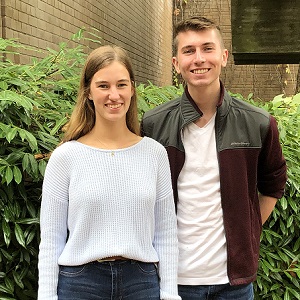
Serena Sturton and Brennen Gilbert
LandOne: A Launch Pad for University
Brennen Gilbert is the first in his family to go to university. With few family members available to share their personal experiences about transitioning from high school, he was open to finding different means of support. Shortly after being accepted into UBC’s Land and Food Systems, a sign appeared.
“I received a handwritten postcard from Christine Klaray (Director of Student Services) that gave a run down on LandOne,” Gilbert says. “It stood out because it was personally written and after reading it, I signed up because I thought this could ease the transition to university. I was right – on the first day of school, I made close friends.”
LandOne is a first-year cohort program offered by the Faculties of Forestry and Land and Food Systems – two smaller units at UBC that share lots of synergy with their teachings about land use, forests and food systems.
It makes transition to university life easier by building a community of support between a small group of approximately 60 students who take the same math, English, biology, and microeconomics classes, along with an integrated seminar.
It’s about connections – between students, students and their instructors, and connections of ideas in the curriculum related to forests, land use and food systems.
Gilbert said he was able to cultivate close friendships with both forestry and LFS students, something that would have been almost impossible to do without being enrolled in the joint cohort.
Serena Sturton from the Faculty of Forestry chose LandOne for a similar reason. She came from a small private school and wanted to experience a small community within UBC, which has almost 55,000 students on its Vancouver campus.
“I felt freedom with learning in LandOne: I could ask questions and approach professors who were very personable,” Sturton
said. “I found a place of belonging and I felt super comfortable in a big campus where I’m not just a number but I’m known by professors and peers.”
Curriculum in LandOne is structured to be relevant to students. Instructors look at complex issues around sustainability, forestry, agriculture, food security and health from multiple angles.
“LandOne provided a real, global and broader perspective about how all things are intertwined and not just from a forestry focus, but considering agriculture and ways of cultivating land,” said Sturton.
Also, Indigenous learning is integrated into the curriculum. Students learn about naming conventions for plants, study Indigenous culture all over the world, with a particular focus on Musqueam community because of the location of UBC
Vancouver campus on unceded Musqueam territory.
“This will be important in terms of respect for our jobs in these fields,” said Sturton. “We learned that Indigenous people take a longer term view with economics, considering how their actions will impact seven generations from today; these
perspectives drive their decisions.”
Adding to the sense of community is a dedicated learning space for LandOne students that is both a study and social
space, in addition to housing professor office hours.
LandOne students also experience additional social and experiential learning opportunities, such as a two-day field
trip to UBC’s Malcolm Knapp Research Forest, to experience first-hand the coastal old growth rainforest, and visits to UBC
Farm, a 24-hectare farm at the south end of campus where more than 200 varieties of organic produce are grown.
The LandOne cohort launched in the 2018-2019 academic year. Some logistics are being improved this year; for instance,
both Gilbert and Sturton, now second-year students, agree that greater efforts are needed to ensure international and domestic students interact more on group projects and socially. However, overall LandOne provided an outstanding level of support and a strong foundation for their transition to university.
Tagged with: 2019, Undergraduate
New Research Opportunities for Undergraduate Students
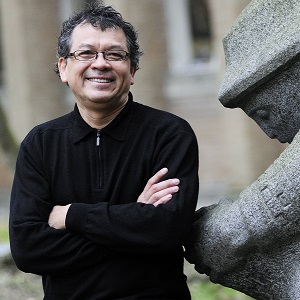
Eduardo Jovel
New Research Opportunities for Undergraduate Students
To engage more undergraduate students in research, UBC introduced the Program for Undergraduate Research Experience (PURE) in 2018. Two LFSrelated projects are now underway thanks to two-year funding from PURE.
Eduardo Jovel, Associate Professor and Director, Indigenous Research Partnerships (left), leads the Indigenous Undergraduate Research Experience (IURE) to create research learning models and curricula focussing on Indigenous land-based research. The program is based at Xʷc̓ ic̓əsəm Garden at UBC Farm, and will train students in cultural competency, community
engagement, community-based participatory research, and ethical and political dimensions of researching with Indigenous communities in B.C.
In another PURE project, Hannah Wittman, LFS Professor, and Amanda Giang, Assistant Professor, Departmentof Mechanical Engineering, are developing a new interdisciplinary research training course. Their project, called Sustainability Science: An Immersive Research Training Experience in Socio-Ecological Systems, will build training and mentorship skills for postdoctoral teaching fellows and graduate students, and team-based undergraduate peer learning opportunities. It calls
for a high level of collaboration with faculty members associated with the Institute for Resources, Environment and Sustainability and three UBC Research Excellence Clusters (Diversified Agroecosystems, Biodiversity, and Environmental Justice).
Tagged with: 2019, Undergraduate
Measuring Tradeoffs When Economics Activity Grows
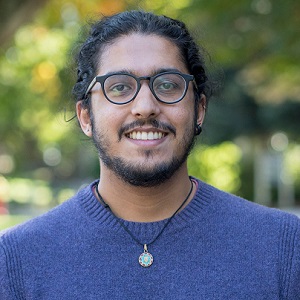
Raahil Madhok
Measuring Tradeoffs When Economics Activity Grows
Raahil Madhok is passionate about understanding the relationships between human activity and climate change. He is a PhD student in Integrated Studies in Land and Food Systems and recipient of the Joseph-Armand Bombardier Scholarship.
In his research, he estimates the economic cost of climate change, the impact of human activity on the environment, and uses big data and data science to hopefully discover something new with these tools and information sources. He is also excited that his research may inform future policy decisions.
“Cost-benefit analysis is the core decision-making tool in environmental economics,” says Madhok. “My research is ultimately about tradeoffs. Greater economic activity is sometimes at the expense of environmental quality, and I am seeking to measure this disconnect.”
Madhok holds a MA in Economics from UBC, and a BA in Economics and Environment from McGill University. He is currently working on three projects based in India:
- The first project aims to estimate the environmental and social costs of coal-fired power plants. As 70 per cent of India’s electricity is coal-based, his goal is to show the consequences for local air pollution and infant health.
- The second project assesses how economic growth and the encroachment of infrastructure into forests affect bird species diversity.
- The third project examines ruralurban migration and agricultural technology adoption. As people move into cities, rural farmers in India are left with less labour. He is studying how farmers adapt, whether they invest in yield-enhancing technology, and the environmental implications of doing so.
Madhok relies on Python and R for analysis and coding. In the biodiversity loss project, he uses data from 13 million
bird-sightings from the eBird app, as well as over one billion pixels of forest cover data from NASA satellite images. In the power plant project, he uses machine learning algorithms to predict the location of power plants based on land features, such as coal mines, elevation, and bodies of water.
Two of his research projects are collaborations with faculty and doctoral students across disciplines and countries. The power plant project is a joint one with Rohini Pande (Yale, Economics), Kevin Rowe (Harvard, Public Policy), and Anish Sugathan (IIM-Ahmedabad, Management). The project on migration and farm technology is a collaboration with Frederik Noack (UBC, Land and Food Systems), Mushfiq Mobarak (Yale, School of Management) and Olivier Deschenes (UC Santa Barbara, Economics).
He hopes that the research does more than just inform, and becomes a tool for decision-making.
“My hope is that it becomes part of an evidence base for decision-makers when evaluating existing or planned environmental policy,” said Madhok. “My research, and that of my colleagues, makes up the decision-making tool for policymakers to allocate resources towards policy with the greatest environmental benefits and minimize costly programs.”
As the financial cost of being a full-time graduate student can be tough, he feels incredibly privileged to be selected for the award. Earning a scholarship was something he had set his sights on for many years.
“I was rejected when I applied in my first- and second-year of studies, so perseverance is definitely worth it.” He is grateful to his Land and Food Systems supervisor, Professor Sumeet Gulati, as well as his former academic mentors, letter-writers, and family members for playing instrumental roles in the process.
Interested in Food and Resource Economics (FRE) research? Check out the website here!
Tagged with: 2019, Food and Resource Economics, Graduate
Launching Canada’s First Open Education Soil Science Textbook
Launching Canada’s First Open Education Soil Science Textbook

How do you bring 36 authors to write a book? That’s the task at hand for Maja Krzic, Associate Professor in LFS, and Fran
Walley, Professor in the Department of Soil Science at the University of Saskatchewan.
Their ambitious, two-year project will launch Canada’s first open, online soil science textbook providing a strong
foundation for beginners to the topic. They have rounded up 36 contributors – current or recent teachers – to write chapters on soil genesis, organic matter, nutrient cycling, water/physics, chemical properties, biodiversity and classification. The textbook will be an open educational resource available to instructors or students without cost, and with an open license allowing for reuse, revision, and redistribution.
Funding for the project came from BCcampus and the Canadian Society of Soil Science, of which Krzic is a co-chair of the Soil Education Committee. This will be the first national collaboration for BCcampus as the contributors live right across Canada, bringing a broad knowledge of soils from B.C. to Newfoundland.
Currently, there is no Canadian-based textbook that provides an introduction to soil science.
Krzic and Walley are steering the project as lead editors. Among the contributors from 13 universities and three government bodies, two are from UBC’s Faculty of Land and Food Systems – Sandra Brown, Soil Science Instructor, and Les Lavkulich, Professor Emeritus, who serves as Program Director, Global Resource Systems, and Academic Director, Master of Land and Water Systems.
Tagged with: 2019, Faculty, Soil Science
A Message from the Dean
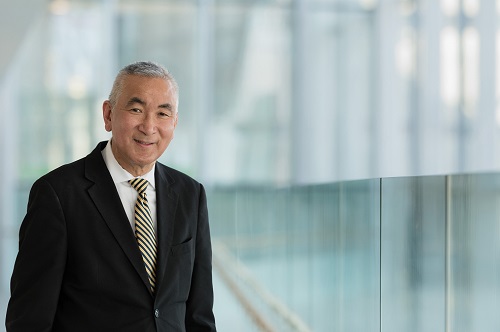
Rickey Yada
A Message from the Dean
I hope you enjoy the fall issue of ReachOut magazine.
I always find it inspiring to see the research of faculty members and graduate students. In this issue, you will learn how researchers are tackling climate change by using data and technology to bring new information to decision-making, and how we are working to improve the welfare of companion animals and the adoption rates of animals in shelters.
You can also read about LandOne, a first-year cohort option that aims to improve the transition from high school to university life.
In other news, I am pleased that I have been extended for a second five-year term starting October 1, 2019 as Dean of the Faculty of Land and Food Systems. This provides me and our faculty and staff another term to work on raising the bar through increasing research intensity, enhancing studentcentered learning and engagement, leveraging opportunities for partnerships, recognizing excellence in the Faculty, and building a stronger sense of community.
Our strategic plan – the Action Plan 2016-2020 – has helped the Faculty to renew its mission and goals, aligning them with the university’s strategic plan. We will soon be revising our strategic plan for the next term – taking into account some of the long-term global issues facing land and food systems, and how we are best positioned to address them.
I am confident the Faculty will continue to build on its strengths to address critical global issues around food security; sustainable agriculture and the environment; food, nutrition and health; and food safety and quality. I look forward to working with all of my colleagues here in the Faculty over my next term and to meeting more of our alumni and partners in future.
Sincerely,
Rickey Yada
Dean and Professor, Faculty of Land and Food Systems
